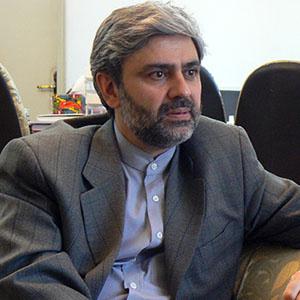Release of Hostages Example of Iran-Pak Successful Cooperation

Iranian Foreign Ministry Spokesman Seyed Mohammad Ali Hosseini described release of Iranian hostages by the Pakistani police early this week as a good example of successful cooperation between Tehran and Islamabad.
Speaking to reporters during his weekly press conference here on Sunday, Hosseini praised Pakistani officials' prompt action in arresting the hostage-takers, and mentioned that the case also displayed proper coordination between the two countries' responsible bodies.
The spokesman also said that the two sides have envisaged good coordination and cooperation to reinvigorate security in shared borders and strengthen campaign against bandits, traffickers and armed groups, and assured that Tehran and Islamabad would increase security cooperation in future.
Elsewhere, he pointed to Iraq's issue, and stressed that Tehran has always striven to use its influence to establish unity among the different groups in that country, adding that in talks with the different Iraqi groups, Iran always stresses the need for enhanced vigilance among the entire Iraqi nation.
Meantime, the spokesman confirmed reports about an upcoming visit to Iraq by Iranian President Mahmoud Ahmadinejad, but said no specific date has yet been decided for the trip.
In response to questions about recent reports alleging that the United Nations peace-keeping troops have prevented Iran's humanitarian aids and activities in Lebanon, the spokesman underlined, "Cooperation and participation in reconstruction (of Lebanon) is not related to UNIFEL troops."
Also regarding the Lebanese crisis, he voiced Iran's support for any kind of view which could help remove the problem in that country, and reiterated that the crisis in Lebanon would be solved through a Lebanese solution.
Hosseini dismissed speculations about Tehran's mediation between Damascus and Riyadh over the issue of Lebanon, and said Iran has and will always endeavor to increase proximity among the views of different countries and groups to resolve the Lebanese issue.
Asked about the date of a final agreement on a multi-billion-dollar pipeline project for supplying Iran's gas to Pakistan and India, he said Iranian foreign ministry and embassies in Islamabad and New Delhi have reported positive assessments of the trend of talks between the three sides.
"The foreign ministry's departments for economic, regional, Asia, Oceania and the Caucasus affairs are all following up to the issue," he said, and expressed the hope that officials of the three countries would hold the final agreement on the $7 bln gas pipeline - also known as the 'Peace Pipeline' - in the near future.
Asked about the recent agreement between Iran and the International Atomic Energy Agency (IAEA), he said, "The agreement proved Iran's commitment and goodwill in the nuclear dispute and enabled a logical trend and sincerity for finding a diplomatic settlement."
"I hope this trend will also continue in the talks with Solana," the spokesman said, but refrained from disclosing the date and venue of the next round of talks between Solana and Iran's chief nuclear negotiator Ali Larijani.
Iran and the IAEA agreed last Tuesday on a plan of action which aims not only to remove all technical ambiguities by the IAEA over Iran's nuclear projects but also prepare grounds for political talks between Larijani and Solana.
The Iranian spokesman further rejected speculation that Iran has made several concessions to finalize the agreement with the IAEA, and said all Tehran did was to strengthen cooperation with the IAEA based on its international commitments.
While criticizing the negative US approach towards the agreement, Hosseini hoped the positive trend would be reflected in next month's IAEA report to its board of governors and also that other countries would "follow the logical rather than the antagonistic trend by the US".
Hosseini further warned that any fresh resolution by the UN Security Council against Tehran would leave negative impacts on Iran's cooperation with the other side.
Elsewhere, he pointed to an upcoming ministerial meeting of the Non-Aligned Movement (NAM) in Tehran, and said that 80 countries have already voiced preparedness to participate in the two-day conference on September 3 and 4, adding that the event would also be attended by the secretary general of the Organization of the Islamic Conference (OIC), the United Nations High Commissioner for Refugees (UNHCR) and secretary general of the Economic Cooperation Organization (OIC).
In another part of the conference, Hosseini pointed to the US propaganda efforts to label the Islamic Revolutionary Guard Corps (IRGC) as a terrorist group, and stressed that the move would merely increase Iranian nation's hatred for the United States.
Hosseini reminded that IRGC is a fully popular body, and described such accusations a result of the United States' policy of projection (of responsibilities and blames) which has long been practiced by Washington .
"Americans should know that the Corps is much popular among the Iranian nation and the Americans' propaganda confrontation with the Corps will increase Iranian nation's hatred for them," he said.
Regarding the next round of Iran-US talks over Iraq, Hosseini said that Iraqi officials are now consulting with the both sides to specify a proper date for the next meeting.
He also dismissed speculations about the enhancement of the level of talks, saying, "We do not perceive any necessity to promote the level of talks."
Asked about the eventual date of a meeting between the five Iranian diplomats kidnapped by the US troops in Iraq in January and their family members, the spokesman said Americans have not yet announced a specific date for the meeting, but meantime, reminded that Iran's follow-ups to the issue would continue.

